Background
Alfred North Whitehead was born on February 15, 1861, in Ramsgate, Kent, United Kingdom. He was the son of Alfred and Maria Sarah (Buckmaster) Whitehead.

Alfred Whitehead
Trinity College, Cambridge CB2 1TQ, United Kingdom
Trinity College, Cambridge, where Alfred Whitehead received his Bachelor of Arts, Master of Arts and Doctor of Science degrees.
The Order of Merit, which Whitehead received in 1945.
6-9 Carlton House Terrace, St. James's, London SW1Y 5AG, United Kingdom
In 1903, Whitehead was elected to the Royal Society of London for his merits.
British Academy, London, United Kingdom
In 1931, Whitehead was elected fellow of the British Academy.






(In The Axioms of Descriptive Geometry, after the statemen...)
In The Axioms of Descriptive Geometry, after the statement of the axioms, the ideas considered were those concerning harmonic ranges, projectivity, order, the introduction of coordinates, and cross-ratio.
https://www.amazon.com/Axioms-Descriptive-Geometry-Classic-Reprint/dp/1330176383
1907
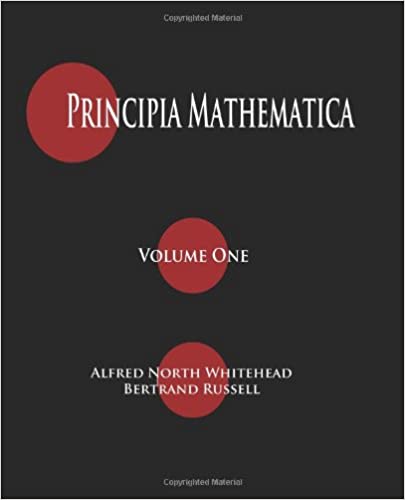
(Principia Mathematica provided a detailed account of math...)
Principia Mathematica provided a detailed account of mathematical logic and set theory, and argued that all, or at least much mathematics could be built upon it.
https://www.amazon.com/gp/product/1603864377/ref=dbs_a_def_rwt_bibl_vppi_i12
1910
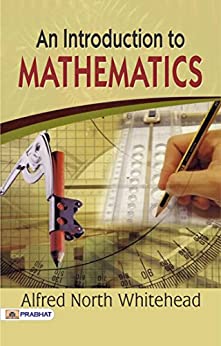
(An Introduction to Mathematics is a brisk introduction to...)
An Introduction to Mathematics is a brisk introduction to a series of mathematical concepts, a history of their development and a concise summary of how today's reader may use them.
https://www.amazon.com/gp/product/B074FZ6DYS/ref=dbs_a_def_rwt_bibl_vppi_i1
1911

(An Enquiry Concerning the Principles of Natural Knowledge...)
An Enquiry Concerning the Principles of Natural Knowledge is a philosophical consideration of the traditions and data of science, followed by a detailed development of what the author terms the method of extensive abstraction, which deals in a generalized and systematic manner with the relations of time and space.
https://www.amazon.com/gp/product/B018GFO95C/ref=dbs_a_def_rwt_hsch_vapi_tkin_p1_i7
1919

(In addition to his brilliant achievements in theoretical ...)
In addition to his brilliant achievements in theoretical mathematics, Alfred North Whitehead exercised an extensive knowledge of philosophy and literature that informs and elevates all of his works. This book represents one of his most significant achievements in the field of natural philosophy. The Concept of Nature originated with Whitehead's Tarner Lectures, and it offers undergraduate students and other readers an absorbing exploration of the fundamental problems of substance, space, and time. Whitehead's discussions are highlighted by criticism of Einstein's method of interpreting results, and by his alternative development of the celebrated theory of the four-dimensional space-time manifold.
https://www.amazon.com/gp/product/B00A73AWEE/ref=dbs_a_def_rwt_bibl_vppi_i2
1920
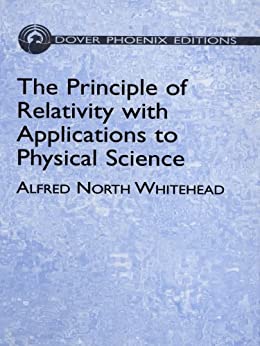
(An exposition of an alternative rendering of the theory o...)
An exposition of an alternative rendering of the theory of relativity, this volume is the work of the distinguished English mathematician and philosopher, Alfred North Whitehead. Suitable for upper-level undergraduates and graduate students, its three-part treatment begins with an overview of general principles that may be described as mainly philosophical in character. Part II is devoted to physical applications and chiefly concerns the particular results deducible from the formulas assumed for the gravitation and electromagnetic fields. The final part consists of an exposition of the elementary theory of tensors. The author notes that the text's order proceeds naturally from general principles to particular applications, concluding with a general exposition of the mathematical theory, special examples of which have occurred in the discussion of the applications. Physicists, Whitehead suggests, may prefer to start with Part II, referring back to a few formulas mentioned at the end of Part I and mathematicians may start with Part III. The whole evidence, he adds, requires a consideration of all three parts.
https://www.amazon.com/gp/product/B00A73FHS0/ref=dbs_a_def_rwt_hsch_vapi_tkin_p1_i8
1922
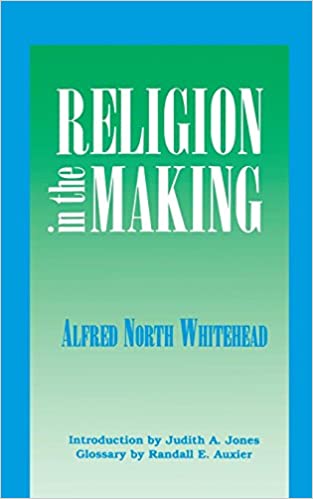
(Religion in the Making offers a concise analysis of the v...)
Religion in the Making offers a concise analysis of the various factors in human nature which go toward forming a religion, to exhibit the inevitable transformation of religion with the transformation of knowledge and to direct attention to the foundation of religion on our apprehension of those permanent elements by reason of which there is a stable order in the world, permanent elements apart from which there could be no changing world.
https://www.amazon.com/Religion-Making-Lowell-Lectures-1926/dp/0823216462/ref=sr_1_1?dchild=1&keywords=Religion+in+the+Making+whitehead&qid=1594132923&s=digital-text&sr=1-1-catcorr
1926
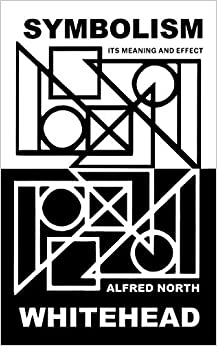
(Symbolism, Its Meaning and Effect is Whitehead's response...)
Symbolism, Its Meaning and Effect is Whitehead's response to the epistemological challenges of Hume and Kant in its most vivid and direct form.
https://www.amazon.com/Symbolism-Barbour-Page-Lectures-University-Virginia/dp/082321138X/ref=sr_1_1?dchild=1&keywords=Symbolism%2C+Its+Meaning+and+Effect+whitehead&qid=1594133280&s=digital-text&sr=1-1
1927

(One of the major philosophical texts of the 20th century,...)
One of the major philosophical texts of the 20th century, Process and Reality is based on Alfred North Whitehead's influential lectures that he delivered at the University of Edinburgh in the 1920s on process philosophy. Whitehead's masterwork in philosophy, Process and Reality propounds a system of speculative philosophy, known as process philosophy, in which the various elements of reality into a consistent relation to each other. It is also an exploration of some of the preeminent thinkers of the seventeenth and eighteenth centuries, such as Descartes, Newton, Locke, and Kant. The ultimate edition of Whitehead's magnum opus, Process and Reality is a standard reference for scholars of all backgrounds.
https://www.amazon.com/Process-Lectures-Delivered-University-Edinburgh/dp/0029345707/ref=sr_1_1?crid=2O9DVESLVV7GM&dchild=1&keywords=alfred+whitehead&qid=1594129221&sprefix=alfred+whi%2Caps%2C270&sr=8-1
1929
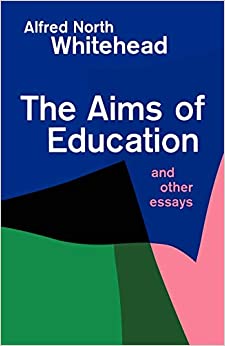
(The Aims of Education and Other Essays presents the texts...)
The Aims of Education and Other Essays presents the texts of a series of lectures delivered between 1912 and 1928 on the purposes and practice of education.
https://www.amazon.com/Aims-Education-Other-Essays/dp/0029351804/ref=sr_1_1?dchild=1&keywords=The+Aims+of+Education+and+Other+Essays.+whitehead&qid=1594133844&s=digital-text&sr=1-1
1929
educator mathematician philosopher author
Alfred North Whitehead was born on February 15, 1861, in Ramsgate, Kent, United Kingdom. He was the son of Alfred and Maria Sarah (Buckmaster) Whitehead.
Alfred Whitehead was tutored by his father until the age of fourteen. Then from 1875 till 1880, he received a solid education in classics, science and mathematics at a public school in Sherborne, Dorset. He subsequently earned a scholarship to Trinity College at Cambridge University, where he studied mathematics while gaining extracurricular knowledge in numerous fields, including politics, history, philosophy, and literature. In 1884 he received a Bachelor of Arts degree there. That same year he was appointed a fellow of Trinity College and subsequently an assistant lecturer in mathematics. Having earned a Master of Arts degree in 1887, he was promoted to the post of senior lecturer. He obtained a Doctor of Science degree in 1905.
After receiving his degrees, Alfred Whitehead continued his career at Trinity College, Cambridge. In 1911 he joined University College London as a lecturer in applied mathematics and mechanics becoming a reader in geometry in 1913. From 1914 till 1924 he was a professor of applied mathematics at Imperial College London. Then he became a professor of philosophy at Harvard University, the position he held till 1937. During the next years he was an emeritus professor at this university.
Whitehead's first book, A Treatise on Universal Algebra, on which he worked for seven years, was published in 1898. This was an ambitious work in which Whitehead, as scholars have observed, expanded the domain of algebra, establishing it as a fundamental method of reasoning which would - as Victor Lowe noted in "The Development of Whitehead's Philosophy" (published in Paul Arthur Schilpp's book The Philosophy of Alfred North Whitehead) - dominate intellectual inquiry, with the notable exception of philosophy. Because Whitehead, in his mathematical investigations, tacitly accepts "eternal objects" whose existence in no way depends on the physical world, scholars have tended to identify his first book as the fountainhead of the idealistic, Platonic philosophy he developed in his later works.
Whitehead began the second volume of his Treatise on Universal Algebra, but his work was interrupted by a project started in collaboration with Bertrand Russel, a former student. As colleagues in 1900, they attended an international philosophical conference in Paris, where they were introduced to the pioneering work in symbolic logic being done by the Italian mathematician Giuseppe Peano. It was Peano's goal to create a formal language which would encompass mathematics and mathematical logic. Accepting a restricted number of mathematical symbols, Peano created a notational foundation for his proposed language, which many mathematicians, Whitehead and Russell included, found viable in investigations of the foundations of mathematics. Laboring for several years, they produced the three-volume Principia Mathematica, which Muir's Larousse Dictionary of Scientists calls "the greatest single contribution to logic since Aristotle."
In writing the Principia, Whitehead and Russell embarked on a project, which historians of science have regarded as among the most monumental in the history of mathematics. In essence, their task was to place mathematics on an absolute foundation of pure logic. Although the book remains one of the great classics of mathematics, the project ultimately failed. The Russell-Whitehead construction also made a contribution in another direction. It carried out a thorough axiomatization of logic in an entirely symbolic form and so advanced enormously the subject of mathematical logic.
Whitehead, who was particularly interested in geometry, wanted to write a fourth volume of the Principia on geometry, but the project was never completed. Nevertheless, Whitehead's work in geometry, which in turn led to his critical contributions to the ongoing discussion on the nature of space, remains not only valuable for science but also, as commentators have emphasized, relevant to his philosophy. In fact, for Whitehead, it seems, geometry was the path that led him to philosophy.
In a famous 1916 address, The Aims of Education: A Plea for Reform, Whitehead argued convincingly that the traditional British model of classical education for an aristocratic elite was outmoded. What he proposed instead was a varied and inclusive curriculum which would enable students to gain both academic and technological skills, without encumbering them with empty erudition and useless knowledge. Whitehead's philosophy of education, later summarized in his The Aims of Education, essentially urged educators to foster creativity, critical thinking, and intellectual independence in students.
Having abandoned the project of the fourth volume of Principia Mathematica, Whitehead from 1919 to 1924 worked on the philosophical foundations of the physical sciences. In many instances, from that point in his career, his books consisted of gatherings of lectures or essays he had previously given. For example, his 1920 Tarner Lectures, given at Trinity College as the first in that lecture series, became his book The Concept of Nature. His other books belonging to this period are An Enquiry Concerning the Principles of Natural Knowledge and The Principle of Relativity, with Applications to Physical Science. These works reflect Whitehead's effort to reconcile his metaphysical temperament with facts presented by natural science.
In 1924, when Whitehead was sixty-three, he moved to the United States to begin teaching at Harvard University. This marked the third, and perhaps the most productive, period of his career, in which he focused on metaphysics and the history of ideas. His Science and the Modern World, primarily consisting of his eight Lowell Lectures given at Harvard in that year, further developed the metaphysical ideas to which he was led by his work as a philosopher of science.
In 1929 Whitehead issued Process and Reality, which is generally regarded as his greatest work. It is important to note, however, that its audience faced formidable difficulties. One of the difficulties stemmed from that work's publishing history. Its first edition contained so many errors that the text - often rather difficult to follow because of the complexity of Whitehead's ideas - seemed, at times, quite obscure. Even in the corrected edition, however, the reader is confronted with Whitehead's prose, which oscillates between moments of brilliant clarity and segments that commentators have described as obscure, even impenetrable. Whitehead himself was aware of the difficulties inherent in his prose style, but he believed that philosophical discourse, in order to express to the fullest extent possible the rich complexity of a person's experience, had to subordinate the spirit of natural language to the demands of philosophy.
Whitehead, who neither engaged in the doctrinal disputes of organized religion nor assumed that his authority as a famous philosopher and scientist in any way entitled him to pontificate on religious subjects, addressed issues, such as personal immortality, which followers of many religions, including Christianity, regarded as fundamental. Such issues, however, important they may be to religious people or people in general, are often viewed with suspicion, even horror, by academic philosophers. Whitehead, however, did not hesitate to lecture on personal immortality to the Harvard Divinity School, speaking not as a professional philosopher, or a Christian, but as a person whose thinking had led him to meditate on immortality.
Whitehead concludes his Process and Reality with a discussion of immortality, a discussion, which, apparently leaving the confines of philosophical discourse, adopts an almost Christian tone in its frank insistence that “the kingdom of heaven is with us today." In fact, Whitehead, as commentators have noted, closes his greatest work with a promise, expressed in lyrical prose, of personal immortality to those individuals who, regardless of their faith or lack thereof, remain active participants in the World of Value.
In 1933, the year when Adolf Hitler was elected Chancellor of Germany, Whitehead issued Adventures in Ideas, a volume about civilization. Without attempting to formulate a precise definition of civilization, Whitehead proposed a set of qualities that societies need to satisfy in order to be considered civilized. These qualities are Truth, Beauty, Adventure, Art, and Peace. Critics have described Whitehead's ideas about culture and civilization as a reflection of his Platonic meditations about reality in general.
In his Modes of Thought, published in 1938, Whitehead further develops several themes already introduced in Adventures of Ideas, namely the qualities implied in the project of civilization, as well as the ethical context of general discussions about civilization.
Whitehead's final years were filled with much productive work. While he published no books after Modes of Thought, he continued working, contributing important articles, and lecturing. In 1939, he published "An Appeal to Sanity" in Atlantic Monthly, in which he discussed English foreign policy in Central Europe and Palestine. Two years later, he delivered his famous lecture in which he tackled the difficult question of immortality. In 1947, when Whitehead died, his works had already become classics.
He is also remembered as a contributor to the Encyclopedia Britannica and professional journals, magazines and newspapers, including Atlantic Monthly, Boston Daily Globe, Harvard Business Review, and Mind.
Regarded as one of the greatest intellectual figures of the twentieth century, Alfred North Whitehead was a philosopher and mathematician whose writings have exerted a tremendous influence on a variety of fields of intellectual inquiry, including philosophy, science, history, education, and theology. At his best, Whitehead has captivated generations of readers, who, even if they were not perhaps attracted to academic philosophy, delighted, as commentators have confirmed, in his efforts to explore the great ideas that have been fascinating humankind since time immemorial.
He was elected to the Royal Society in 1903 for his merits. In 1922 he received the James Scott Prize Lectureship from the Royal Society of Edinburgh. In 1931 he was elected fellow of the British Academy and received the Order of Merit in 1945 there.
(Religion in the Making offers a concise analysis of the v...)
1926(An Enquiry Concerning the Principles of Natural Knowledge...)
1919(One of the major philosophical texts of the 20th century,...)
1929(In The Axioms of Descriptive Geometry, after the statemen...)
1907(In addition to his brilliant achievements in theoretical ...)
1920(An Introduction to Mathematics is a brisk introduction to...)
1911(An exposition of an alternative rendering of the theory o...)
1922(Principia Mathematica provided a detailed account of math...)
1910(The Aims of Education and Other Essays presents the texts...)
1929(Symbolism, Its Meaning and Effect is Whitehead's response...)
1927In fact, Whitehead's philosophical interests included metaphysical questions, such as the existence God, which twentieth-century philosophy has generally tended to ignore.
Unlike the great metaphysicians of the past - Spinoza, Leibniz, Hegel - Whitehead considered his philosophical doctrine only an approximation to understanding the infinite complexity of life. Having witnessed the collapse of the seemingly immutable Newtonian system of the universe, Whitehead refused to accept dogmatism in philosophy, science, or theology.
There is a requirement that societies support themselves by constantly realizing their own timeless objects. Societies are organized in time. Societies are expressions of objects that one encounters in his everyday understanding, such as people, cars, and other objects in one's daily life. Thus, as Whitehead considered, people can also be constructed from the basic elements of his metaphysics and in accordance with his requirements for rationality and consistency.
In the concept of "eternal objects," Whitehead came very close to the philosophy of Plato and his theory of ideas. Real events have the ability to realize certain properties. Whitehead also attributed existence to these "pure possibilities," an existence that can be realized concretely and which in turn defines itself through concrete realizations in events. These possibilities are included in specific events, they are recorded by them, like other real events. For Whitehead, this also explained the relative stability of the laws of nature and things, which ultimately also change in the process of becoming.
For Whitehead, the world has no beginning in time and no destination. Since the world has always existed, one cannot speak of an all-embracing or absolute ideal towards which development as a whole could move. Therefore, the ideal of creation must be sought directly in the basic elements of reality. Thus, for Whitehead, the ultimate goal is the highest possible intensity of the experience for any real person.
Whitehead developed a concept of the mind adapted to the real conditions of life of organisms. According to this, intelligence arises not only from the survival of a living being but also from the "good life" and "better life." The art of living is, firstly, to live in general, secondly, to live in a satisfactory way, and, thirdly, to be able to achieve an even higher degree of satisfaction. For Whitehead, "living well" and "living better" are value-creating goals for sentient beings.
Quotations:
"Every science must devise its own instruments. The tool required for philosophy is language. Thus philosophy redesigns language in the same way that, in physical science, preexisting appliances are redesigned. It is true that the general agreement of mankind as to experienced facts is best expressed in language. But the language of literature breaks down precisely at the task of expressing in explicit form the larger generalities - the very generalities which metaphysics seeks to express."
"What is done in the world is transformed into a reality in heaven, and the reality in heaven passes back into the world. By reason of this reciprocal relation, the love in the world passes into the love in heaven, and floods back again into the world. In this sense, God is the great companion - the fellow-sufferer who understands."
"We find here the final application of the doctrine of objective immortality. Throughout the perishing occasions in the life of each temporal Creature, the inward source of distaste or of refreshment, the judge arising out of the very nature of things, redeemer or goddess of mischief, is the transformation itself, everlasting in the Being of God. In this way, the insistent craving is justified - the insistent craving that zest for existence be refreshed by the ever-present, unfading importance of our immediate action, which perish and yet live forevermore."
Whitehead, as many commentators noted, possessed a quality which is rare among prominent academic philosophers: humility. This quality, one of the many qualities that his friends and colleagues found deeply endearing, manifests itself in his profound respect for his great forerunners.
Alfred Whitehead married Evelyn Willoughby-Wade on December 16, 1890. They had four children, only two of whom survived past the age of twenty: a son died at birth, and another son, Eric Alfred, was killed in combat during World War I, flying as a pilot for the Royal Flying Corps.
